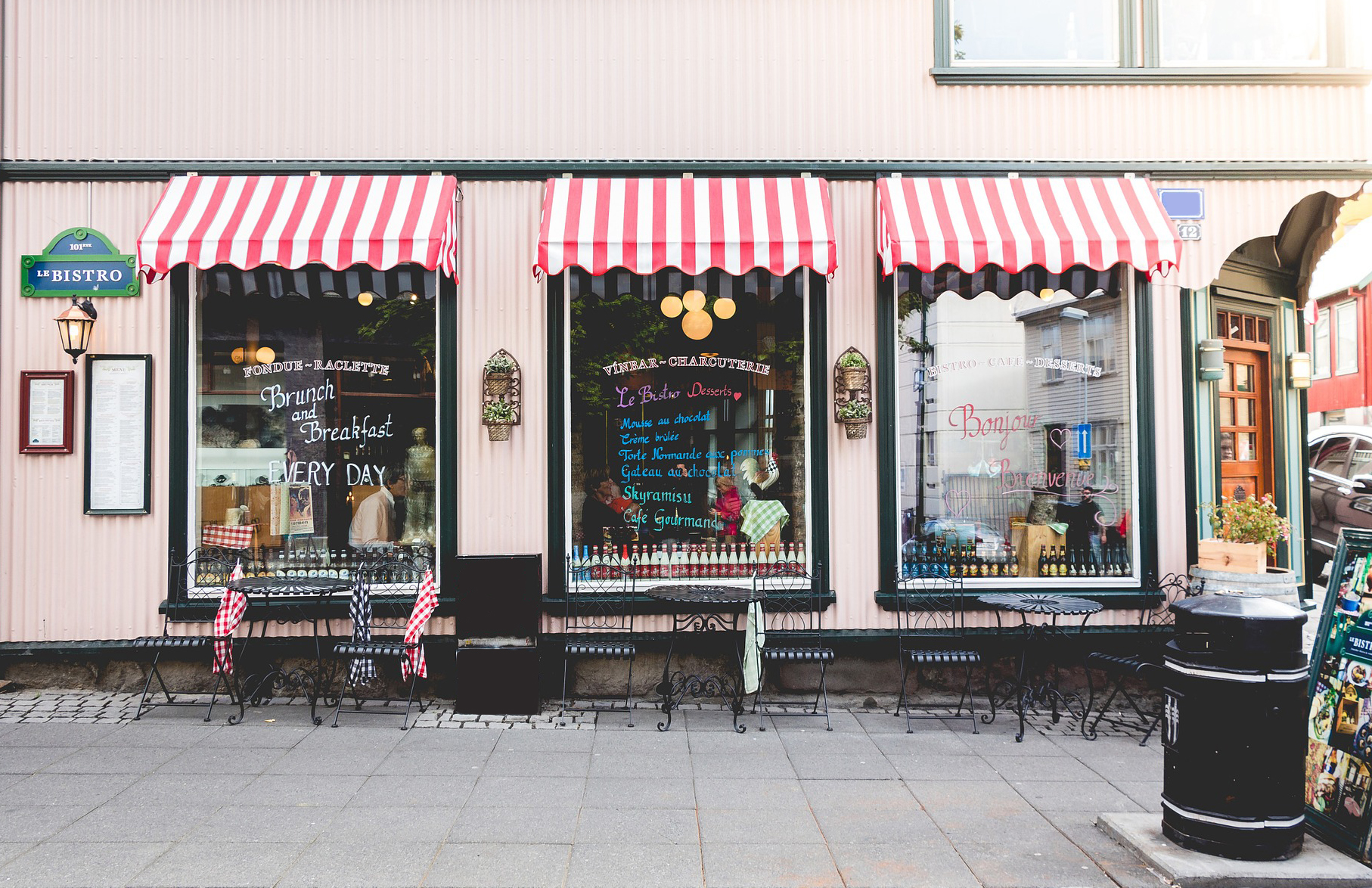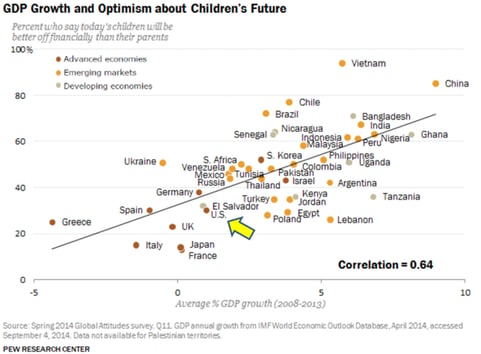The Recession Hurt Our Feelings
By NRC on October 22, 2014
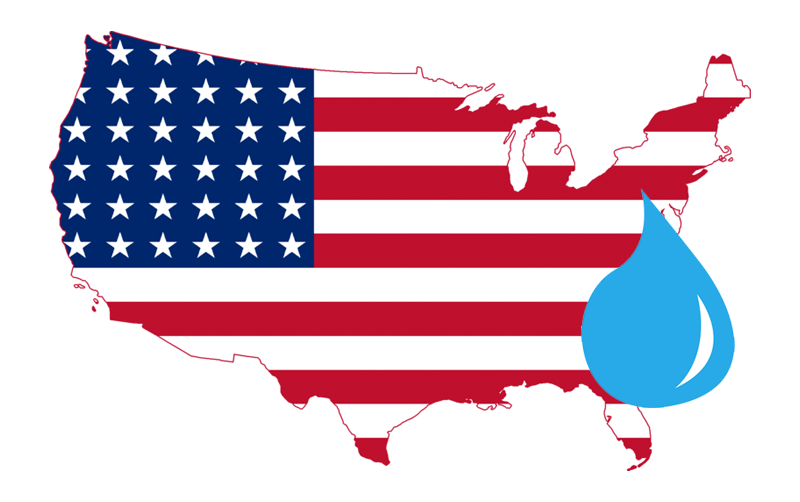
While the consequences of the recession of 2007-2009 on world economies have been well studied, less understood are social-psychological impacts of the recession that have realigned world expectations. Though the economic crash of that time is abating and our recession officially is over, the crash continues as a watershed, affecting not only pocket books but personal perspectives.
A recent PEW study of global attitudes about the world’s economic future shows that the psychological effects of the recession linger, especially in the U.S. and other advanced economies that took the biggest beating.
Evidence that advanced economies were most seriously affected by the Great Recession is abundant. For example, the graph below (source: http://www.tradingeconomics.com/united-states/gdp-growth-annual) shows U.S. GDP growth dropping below zero (the definition of recession) in 2009 at the same time that China’s growth rate also declined, but to a level still so high (above 6{7d2d4cb14c544bbeb3cd4763dc2b1aa4e79f5bb51403ad6dac1e84ac9d980b0d}, measured on the right vertical axis) that its low point was better than the U.S. rate even at its high point of the decade (under 6{7d2d4cb14c544bbeb3cd4763dc2b1aa4e79f5bb51403ad6dac1e84ac9d980b0d} in 2000).
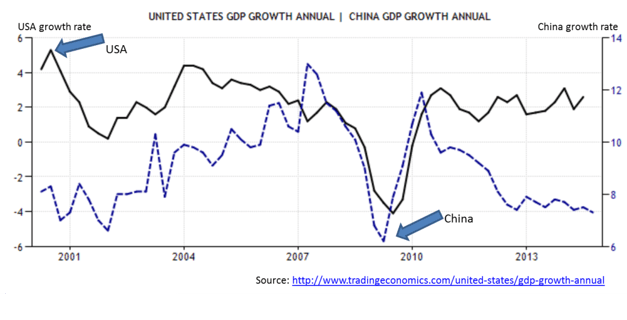 Despite a downturn in both economies, China's growth at its lowest point is still higher than that of the US at its highest. Source: www.tradingeconomics.com
Despite a downturn in both economies, China's growth at its lowest point is still higher than that of the US at its highest. Source: www.tradingeconomics.com
In Pew’s 2014 survey of more than 40,000 residents in 44 countries, among residents in the ten most advanced economies, two adults in three believed that, when grown up, the country’s children will be worse off financially than the respondents themselves. Residents in the U.S. were no different. The U.S. economic recovery into the black took only 18 months, but five years after the end of the recession, doubts about our economic future darken our spirit.
Though no one can predict the future, a relatively hopeless view of what is in store portends all around bad news for good mental health. In the countries with emerging or developing economies, residents were far more sanguine about their kids’ futures, as you can see in the graph, below.
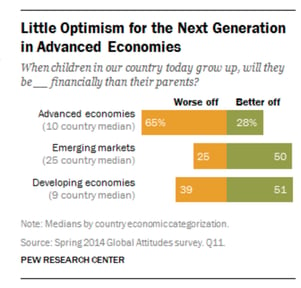 Advanced economies are less optimistic about the future than emerging and developing economies. Source: Pew Research Center
Advanced economies are less optimistic about the future than emerging and developing economies. Source: Pew Research Center
Now, a recession that hits the developed world hardest might be expected to leave psychological scars. In the following graph, you can see the relationship, country by country, between the rate of economic growth and the economic optimism expressed by parents for their children. There is a preponderance of developed economies represented in the pessimistic bottom. And these developed economies are growing slowest. Of course, the math of it suggests that really big economies rarely grow as fast as really small economies. But there appears to be little solace to living in really big economies – in places where people make a lot more money, in cushier jobs with many more benefits (the U.S. , say) compared to spots where work is tough, hours are long and bathroom breaks may not include a bathroom (take Bangladesh). Bangladeshis see a world that is getting economically better; residents of the U.S. do not.
At the same time that the recession (and, no doubt, other unnerving global circumstances) knocked the hope from under U.S. residents, we same dour Americans have not forsaken our core values. Americans believe, more than residents of almost every other country (whether from developed or developing nations) that hard work is how we get ahead and success comes from us, not from influences outside of our control. Believing yourself to be the cause of your own life circumstances often is a sign of strength, but when coupled with the anticipation that your own work will lead to a bleak future, you have a recipe for depression – a condition defined as a pessimistic attributional style, according to the famed psychologist, Martin Seligman.
That hard-driving self-determinism may be the last vestige of optimism in a country coming unhinged or, if we think positively, our belief in ourselves may provide the fuel to rev the country’s economic engine, bringing better times ahead. U.S. free-market enthusiasts may just have enough trust in themselves to pull hard on those fallen bootstraps and re-establish the world order they have come to expect.
But free market Americans who avoid the drag of feeling responsible for a bleak future, will have to compete with a world of optimistic free market enthusiasts as shown in the strangest finding from the Pew study. The world loves a free market and among the people on earth most in favor of the free market system are those who live in the world’s two most well-known socialist and communist countries, respectively, Vietnam and China. Those residents are confident that their children’s future will be bright.
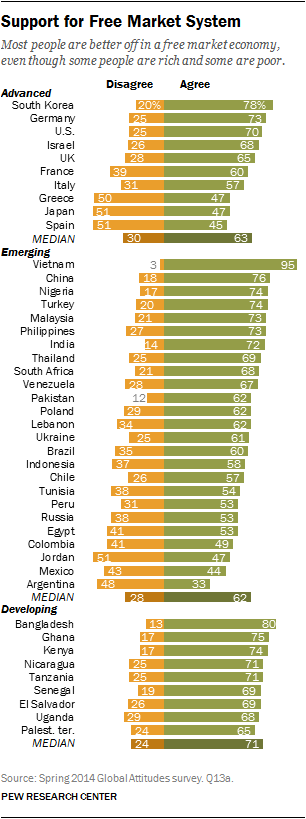 Support for a free market system is high even in countries without free markets. Source: Pew Research Center
Support for a free market system is high even in countries without free markets. Source: Pew Research Center
What we Americans think about our economic future affects how we vote, how much we save, how hard we work, whether we continue with formal education, if we invest. Hurt feelings at a national level linger and their impacts on society should not be underestimated. The turn-around will take work preceded by self-awareness.
Popular posts
Sign-up for Updates
You May Also Like
These Related Stories

Go Where They Are, Not Where You Want Them to Be

The World's Best Tasting Tap Water
